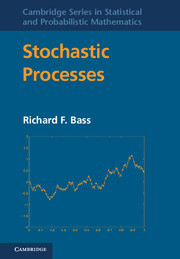Book contents
- Frontmatter
- Contents
- Preface
- Frequently used notation
- 1 Basic notions
- 2 Brownian motion
- 3 Martingales
- 4 Markov properties of Brownian motion
- 5 The Poisson process
- 6 Construction of Brownian motion
- 7 Path properties of Brownian motion
- 8 The continuity of paths
- 9 Continuous semimartingales
- 10 Stochastic integrals
- 11 Itô's formula
- 12 Some applications of Itô's formula
- 13 The Girsanov theorem
- 14 Local times
- 15 Skorokhod embedding
- 16 The general theory of processes
- 17 Processes with jumps
- 18 Poisson point processes
- 19 Framework for Markov processes
- 20 Markov properties
- 21 Applications of the Markov properties
- 22 Transformations of Markov processes
- 23 Optimal stopping
- 24 Stochastic differential equations
- 25 Weak solutions of SDEs
- 26 The Ray–Knight theorems
- 27 Brownian excursions
- 28 Financial mathematics
- 29 Filtering
- 30 Convergence of probability measures
- 31 Skorokhod representation
- 32 The space C[0, 1]
- 33 Gaussian processes
- 34 The space D[0, 1]
- 35 Applications of weak convergence
- 36 Semigroups
- 37 Infinitesimal generators
- 38 Dirichlet forms
- 39 Markov processes and SDEs
- 40 Solving partial differential equations
- 41 One-dimensional diffusions
- 42 Lévy processes
- Appendices
- References
- Index
30 - Convergence of probability measures
Published online by Cambridge University Press: 05 June 2012
- Frontmatter
- Contents
- Preface
- Frequently used notation
- 1 Basic notions
- 2 Brownian motion
- 3 Martingales
- 4 Markov properties of Brownian motion
- 5 The Poisson process
- 6 Construction of Brownian motion
- 7 Path properties of Brownian motion
- 8 The continuity of paths
- 9 Continuous semimartingales
- 10 Stochastic integrals
- 11 Itô's formula
- 12 Some applications of Itô's formula
- 13 The Girsanov theorem
- 14 Local times
- 15 Skorokhod embedding
- 16 The general theory of processes
- 17 Processes with jumps
- 18 Poisson point processes
- 19 Framework for Markov processes
- 20 Markov properties
- 21 Applications of the Markov properties
- 22 Transformations of Markov processes
- 23 Optimal stopping
- 24 Stochastic differential equations
- 25 Weak solutions of SDEs
- 26 The Ray–Knight theorems
- 27 Brownian excursions
- 28 Financial mathematics
- 29 Filtering
- 30 Convergence of probability measures
- 31 Skorokhod representation
- 32 The space C[0, 1]
- 33 Gaussian processes
- 34 The space D[0, 1]
- 35 Applications of weak convergence
- 36 Semigroups
- 37 Infinitesimal generators
- 38 Dirichlet forms
- 39 Markov processes and SDEs
- 40 Solving partial differential equations
- 41 One-dimensional diffusions
- 42 Lévy processes
- Appendices
- References
- Index
Summary
Suppose we have a sequence of probabilities on a metric space S and we want to define what it means for the sequence to converge weakly. Alternately, we may have a sequence of random variables and want to say what it means for the random variables to converge weakly. We will apply the results we obtain here in later chapters to the case where S is a function space such as C[0, 1] and obtain theorems on the convergence of stochastic processes.
For now our state space is assumed to be an arbitrary metric space, although we will soon add additional assumptions on S. We use the Borelσ-field on S, which is the σ-field generated by the open sets in S.We write A0, Ā, and δA for the interior, closure, and boundary of A, respectively.
The portmanteau theorem
Clearly the de?nition of weak convergence of real-valued random variables in terms of distribution functions (see Section A. 12) has no obvious analog. The appropriate generalization is the following; cf. Proposition A. 41.
Definition 30.1 A sequence of probabilities {ℙn} on a metric space S furnished with the Borel σ-field is said to converge weakly to ℙ if ʃ f dℙn → ʃ fdℙ for every bounded and continuous function f on S. A sequence of random variables {Xn} taking values in S converges weakly to a random variable X taking values in S if E f (Xn) → Ef(X) whenever f is a bounded and continuous function.
- Type
- Chapter
- Information
- Stochastic Processes , pp. 237 - 243Publisher: Cambridge University PressPrint publication year: 2011



